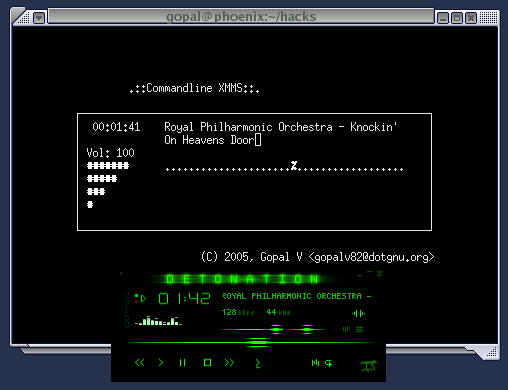I usually work on the command line. 80x25 columns are a lot easier to read than the X terminals with fonts. With my old box, I used to use mpg321 to play music on Alt+F6 terminal. mpg321 sucks totally here - but xmms works well, except for an application xmms uses obsolete OSS audio interface warning in the kernel. Also these days, a lot of what I have are .ogg files. I don't really like mplayer - mainly because it doesn't let me enqueue songs, like xmms does. I could use xmms easily, if I didn't have to switch back to X to skip a song or reduce the volume.
Necessity is the mother of invention, but I didn't have to invent an entire media player here. I had the xmms-remote code in my distfiles directory and I started poking in there. Before soon, I discovered that I had python bindings installed as well. The API is amazingly easy to use. I wrote the xmms code in about 10 minutes - doing curses without any documentation took some time (thank $deity for the test_curses.py)

You can get my original 100-odd lines of cxmms.py. It is pretty much self-explanatory, except for the gratuitous use of lambda. Also it is a good example of how to wait for user input while other screen updates are required. And I want to use the j search shortcut - any volunteers to hack that into the current code ?
It was now 4 AM saturday morning. Sleep is slowly starting to become an optional requirment for me. I went back to the bed and picked up the book to continue reading and the next page had these lines in it.
He was in the company of ... another man who would stay up all night in order to invent an alarm clock to wake him up in the morning.
I got distracted by this while I was hacking away in jit-interp.c trying to fix stack allocation ordering. Reminds me of the last chapter of So Long and Thanks for all the Fish.
Maybe I should trade in this life and ask for a refund ?
--There was a point to this story, but it has temporarily escaped the chronicler's mind.
-- Douglas Adams
